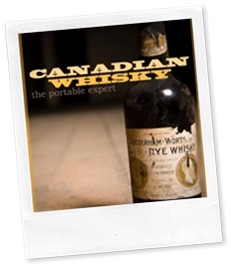 I’m taking part in a four week Twitter event based around Canadian whisky. The idea came from Johanne McInnes (thanks!) and of course Canadian expert and Malt Maniac Davin De Kergommeaux’s work is at the center of it all.
I’m taking part in a four week Twitter event based around Canadian whisky. The idea came from Johanne McInnes (thanks!) and of course Canadian expert and Malt Maniac Davin De Kergommeaux’s work is at the center of it all.
Basically we were sent four samples of Canadian whiskies together with his award-winning book Canadian Whisky – The portable expert, which we read during the last couple of weeks. We know each of the samples is representing a chapter / region / distillery, but they are not disclosed until the end of the Twitter tasting, which is preceeded by a Q&A with Davin. The first instalment was yesterday, but you’re welcome to join in the next three Sundays at 21:00 Western European time, using the Twitter hash tag #DavinTT
 Now I have to admit that none of the 1200+ whiskies on this website had been Canadian so far… I haven’t even tried the the fairly well-known Crown Royal or Canadian Club. I do own a bottle of Glen Breton matured in Ice wine casks, but I hope you agree that’s not even proper whisky, and hopefully not the best example of what Canada has to offer.
Now I have to admit that none of the 1200+ whiskies on this website had been Canadian so far… I haven’t even tried the the fairly well-known Crown Royal or Canadian Club. I do own a bottle of Glen Breton matured in Ice wine casks, but I hope you agree that’s not even proper whisky, and hopefully not the best example of what Canada has to offer.
With the risk of going over it too quickly, in a few lines, what makes Canadian whisky different, other than being made in Canada?
- The majority of Canadian whisky is distilled in column stills. Some distilleries use the more traditional pot stills.
- Nowadays Canadian whisky is always blended (but not to the Scotch definition of grain + malt). They produce neutrally flavoured, higher proof ‘base whiskies’ and blend it with one or more ‘flavouring whiskies’ that have more distinct aromas. By tuning the mix of flavouring whiskies, they can keep a steady profile even when raw materials change. Also, this allows distilleries to have multiple products with different profiles.
- Up to 9.09 per cent of the blend can be other stuff. Other whisky, or caramel, or even brandy or wine! Canadian whisky needs to be matured and married in oak, in Canadian warehouses.
- Rye plays a huge role in Canadian whisky making, up to the point where it became a nickname for Canadian whisky as a whole, you just “drink rye”. More than other grains, it brings along strong flavours, lots of spices and a “refreshing bitterness”.
- Canadian whisky is based around brand names rather than distilleries as is the case in Scotland. Sometimes production of a certain brand can even move over to a different distillery. It’s a more industrial distillery landscape, where history and tradition play a tiny role.
We’ve just tried our first sample, so here goes. Lot N° 40 is produced by Corby at Hiram Walker distillery in Windsor, Ontario (owned by Pernod-Ricard). It’s mostly 7 – 8 years old whisky with some older and some much younger added to the mix. It is made in a 12.000 litre copper pot still from 90% rye grain and 10% malted rye grain. They use a variety of barrels for maturation, both new and used.
It is highly collectable. Lot No. 40 has generated more enthusiasm among whisky connoisseurs around the world than any Canadian whisky Davin could think of. It has become the Black Orchid of Canadian whisky, the quintessential Canadian rye. Recently they are trying to produce more of it, but due to the relatively high age, it will take a while before more people can get hold of it.
 Lot No. 40 (43%, 2012 Edition)
Lot No. 40 (43%, 2012 Edition)
Nose: a mix of harsher, prickly notes (cloves, flints, hints of menthol) with sweeter notes (buttered popcorn, cinnamon). Quite some sourish wood in there. Pine wood (typical for rye, I’m told). Hints of graphite and dust. A slight alcoholic / solventy edge. Certainly outside of my familiar Scotch territory. Gets a little smoother with a drop of water.
Mouth: again quite sour initially (pickled even), slightly woody / tannic (yes, pine needles), with lots of spices and herbs. Ginger, clove, cinnamon. Something of rye bread and sour dough too. Again a slight vanilla/ popcorn layer in the background, but it’s definitely not a sweet dram. Again better with water though.
Finish: not too long, with sourness, pepper and a slightly strange metallic edge in the very end.
Difficult whisky, and I honestly don’t think that is only because I’m not used to Canadian whisky yet. Lots of oak and pickle / prickle. Not at all easy to find around here, but typically around € 35.
Score: 75/100
 Lot No. 40 (43%, 2012 Edition)
Lot No. 40 (43%, 2012 Edition)